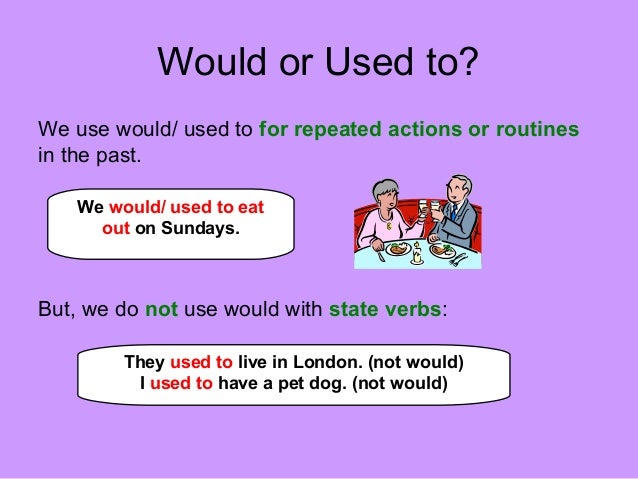We've just learned "used to". Here there is some more information about read it and make sure you understand everything. If you have questions, ask me.
Irena
First, I would like to remind you when and how we use the phrase used to.
First, I would like to remind you when and how we use the phrase used to.
Form: Used To + Base Verb
Used to is always followed by a base verb. Don’t forget to tell your students that used to follows the normal past verb rules: it becomes use to with the auxiliary verb did in questions and negative statements. See section 4 below for examples—make sure you give your students lots of examples with didso that they’ll remember the change!
"Use to"
Used to is a unique expression in English. Its form and function are similar to a modal (i.e., it gives extra information about the verb and is followed by a base verb). Used to shows that an action was performed repeatedly in the past, but is no longer performed in the present. It is commonly used when talking about long periods in the past (e.g., childhood, school years, past job, etc.)
Examples
- I used to eat meat, but I don’t anymore.
- They used to study English every day in high school.
- Did you use to play video games when you were a child?
- Did my sister use to sing when she was little? I forget.
- I didn’t use to play the piano as a child, but I took lessons later on.
- My teacher didn’t use to give us any homework. Now we get homework every day
Here is one more link about this grammar. Please, click on it, read and watch.
Do exercises:
EXERCISE 1
EXERCISE 2
EXERCISE 3
EXERCISE 4
EXERCISE 5
Habitual Past (watch, listen, and remember)

"Would"
When we talk about things that happened in the past but don’t happen anymore we can do it in different ways. We already talked about used to.
Example:
We used to live in New York when I was a kid.
There didn’t use to be a petrol station there. When was it built?
I used to go swimming every Thursday when I was at school.
I used to smoke but I gave up a few years ago.
Remember that "used to" is only for past states/actions that don’t happen now – we can’t use it for things that still happen now.
Also, "used to + infinitive" should not be confused with "be/get used to + ing form" - we are going to talk about it in a separate section.
There is another way of doing the same thing. It's "would."
Example:
Every Saturday I would go on a long bike ride.
My teachers would always say "Sit down and shut up!"
Often either "would" or "used to" is possible. Both of these sentences are possible.
Every Saturday, I would go on a long bike ride.
Every Saturday I used to go on a long bike ride.
However, only "used to" is possible when we talk about past states.
- We used to live in New York when I was a kid.
We would live in New York when I was a kid.
Now, here is a speaking practice. Work with a partner of in small groups. Ask each other these questions and answer them.
1. What is a food that you used to hate but now you like?
2. Who used to be your hero when you were young?
3. Did you use to have a pet?
4. Did you use to get good grades in high school?
5. What used to be your favorite game to play?
6. Where did you use to play when you were a child?
7. How often did you use to get in trouble when you were younger?
8. What was your country like when you were a child?
9. Do you think the past was better than the present? Why or why not?
10. What were some of the benefits of living in the past?
Now, discuss the following topics. Talk about your country’s past (100 years ago), how was the past different from the present:
Food
Weddings
Clothing
School
Work
Recreation (free time activities)
Communication



No comments:
Post a Comment